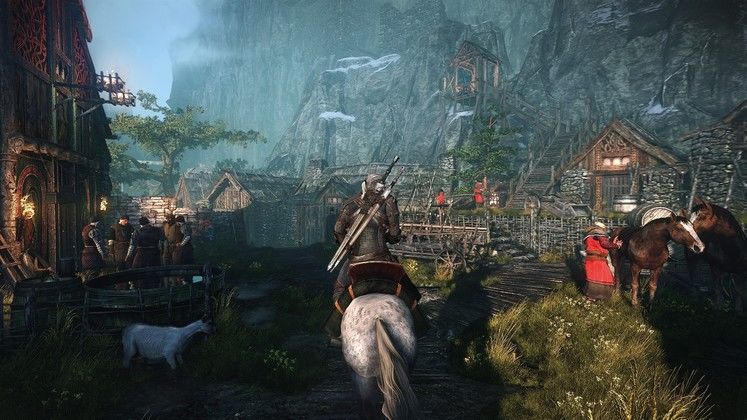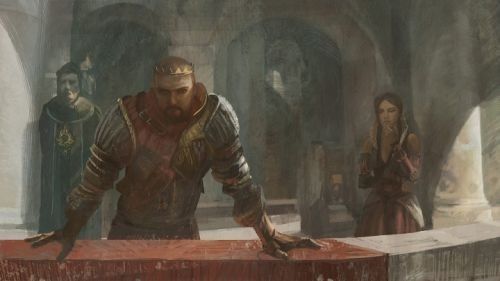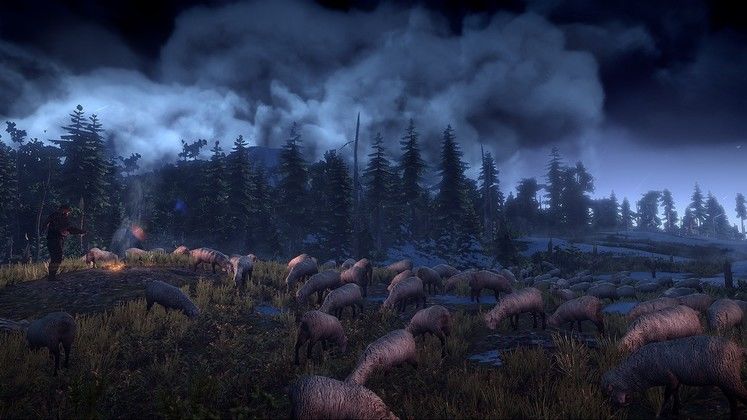Strategy Informer: I understand the open world in The Witcher 3 is set to be over 30 times larger compared to its previous instalment, hypothetically speaking how long will that take the player to travel from corner to corner?
Michal Gilewski: It’s actually 35 times larger. Right now it’s impossible to count because we have to wait until it’s finished. Actually this is something we have on the table - I want to check that, but right now we can’t. We’ll see once it is finished.
 |
| Horsing around |
Strategy Informer: The Witcher 3 is set to introduce quite a sophisticated day/night cycle, wherein monsters behave differently given the time of day. Can you explain this further?
Michal Gilewski: Take for example werewolves. If you want to find a werewolf, you should probably look for them at night time. That said, if there’s a full moon the werewolf will be even stronger: he will morph into some kind of super beast, and he will be way more stronger. Also, if you walk across the streets of Novigrad you will feel the difference, you will feel it more sinister, or perhaps a more sinister community roaming the streets in the night. Also, if certain fields have sheep during the day, you might find monsters have attacked and killed them by night, forcing owners to attempt to keep them safe.
Strategy Informer: The main story will total around 50 hours, with side quests clocking up similar mileage. How do you keep things fresh, for example how do you put a unique spin on, say, a search and retrieve quest?
Michal Gilewski: We have huge teams responsible for making things fresh. If it’s not fresh it’s boring. If it’s boring, well, you can’t be bored for 100 hours, you know? Take our team for example, we have a whole quest department, which is uncommon in the sense that most teams have a general ‘design’ team. Essentially it’s a bunch of talented people making sure all these quests are cool. For each quest we have a team - it’s not like we do the quests and then send them off to the story [writers] or QA to test it. There’s a person from story, from quest, from level design, and from QA responsible for everything about that individual quest. We make sure that on every stage of development the quest is sound, there’s nothing broken, it all makes perfect.
Strategy Informer: Many games nowadays strive to offer players choice - or at least the illusion of choice. The Witcher series is different: choices are often presented with a degree of subtlety. How important is player agency and choice in The Witcher series and how do you maintain it without compromising the rest of the game?
Michal Gilewski: I think we are constantly thinking about choice. We know that this is what the game is about; that we want to reflect a certain degree of realism in our games. The world is a fantasy world which couldn’t ever exist, but we want to make the rest believable. In the real world you are making a lot of choices and we must think of the consequences all of the time, small or big - sometimes we don’t even know that we’ve just made a really important choice. Maybe this is also the difference between the illusion of choice in our games, because sometimes you don’t know you’re making a choice in The Witcher games, then further in the story you realise that, oh my god, when I was talking to that guy, or maybe I’d skipped past the guy begging, I made a choice at that moment and now I have to deal with the consequences of that choice. I think it’s all in our heads, that illusion of choice. And everyone’s thinking about and what could happen, you often hear the team talking in the corridors: no, this isn’t Witcher enough; this is too obvious, that’s not how we want to make it, let’s add a twist.
 |
| Politics has been a key theme throughout the series |
Strategy Informer: Warring factions have been a concurrent theme throughout the series. Has real world politics - wars, unstable political rule etc. - influenced how politics is depicted in the series?
Michal Gilewski: I think the whole world influences what we are designing in the game. First of all, The Witcher games are based on the Andrzej Sapkowski books. He created some political powers in his books, he got his influence from somewhere, but it’s not a copy/paste thing. You can find connections from the modern world, but perhaps also from the middle ages. When we are creating our games of course we have a lot of inspirations, I think this is part of the creative process: you wake up with an idea and spend all day working on it. Perhaps it becomes the seed of something even bigger. To some extent, yes we are [influenced] but I think that politics has inspired us in the same way that fairytales have inspired quests. You may not find exact fairytales, but you will find references to famous fairytales in The Witcher.
Strategy Informer: Speaking of real life politics, Donald Tusk (the Polish Prime Minister) gave Barack Obama a copy of The Witcher 2 as part of a Polish welcome pack on a business visit to Poland. How did that feel?
Michal Gilewski: We first heard of this when someone came to office one day, collecting autographs for a copy of The Witcher 2. When we asked who they were for we were told Barack Obama. We thought, yeah, yeah, we don’t believe it. And then the newspapers announced [Obama had received it] and we were like, wow what just happened? That was cool. Then, this May, when Barack Obama was in Poland, he actually mentioned that he had received the game a couple of years before. That was really exciting. Actually he’s one of three or four presidents with our game - we are collecting them!
Strategy Informer: Going back to the game series itself, why do you think medieval games are so intriguing for both player and developer?
Michal Gilewski: It’s a big bowl of fantasy. Anyone who loves that should love The Witcher to an extent. I’m a big pen and paper role playing devotee, and I think the rest of the studio is too. If you’re interested in that, you probably love medieval as well. It’s a pity, I don’t think it’s really used in movies enough. There was a time when fantasy/medieval was considered not very interesting - Game of Thrones is perhaps changing that now - but now the masses are beginning to talk about it. We’re trying to keep this going: we’re trying to convince people that fantasy is not just about fairytales and knights in shining armour and dark bad wizards, it’s about life and choices.
Strategy Informer: Although I’m cautious to compare The Witcher with Skyrim, they do share similar traits. What makes The Witcher different as far as its priorities are concerned?
Michal Gilewski: Yeah, I mean when you say open world, the first game on your mind is normally Skyrim. I hope that in 2015, that will be The Witcher. We love Skyrim, that’s a great game, but I think that they have a totally different approach. At least that’s what I believe, I’m not in their heads, but when I’m looking at Skyrim, for me it’s a great open world with great storylines and great characters in the middle, whereas when I’m looking at The Witcher I have a great main character with a huge story around him placed within an open world. The perspectives here are different, each looks at things from a different angle. Our game will about you, who you are, how you’re immersing with the world, how you’re interacting with the story everywhere around you, and how this story will influence the whole world.
 |
| The Witcher 3's day/night cycle means no sheep are safe! |
Strategy Informer: One thing previous Witcher games have been slightly criticised for is a somewhat unrelenting learning curve. Will The Witcher 3 address this better for newcomers to the series?
Michal Gilewski: We knew that there would be a lot of new gamers playing The Witcher 3, starting their adventure with this one. We wanted to make sure that the game’s learning curve is then not too steep, that you are introduced to both gameplay mechanics and the story on good pacing. So it’s been designed so that you get a smooth introduction, given time to digest, and then given some more. It’s quite an elaborate process. At the same time however, we didn’t want to dumb the game down, if you’re a skilled gamer you’ll just progress quicker than newcomers.
Strategy Informer: Are there any plans to introduce multiplayer or modding support down the line?
Michal Gilewski: For now it’s a purely single player experience.
Strategy Informer: And it’s definitely going to release in February 2015?
Michal Gilewski: Yeah.
Strategy Informer: Definitely?
Michal Gilewski: Yeah.
Strategy Informer: Definitely?
Michal Gilewski: Yeah, I’ve planned my holidays for just after - we have to.
Strategy Informer: Great. Thanks for your time, Michal.




